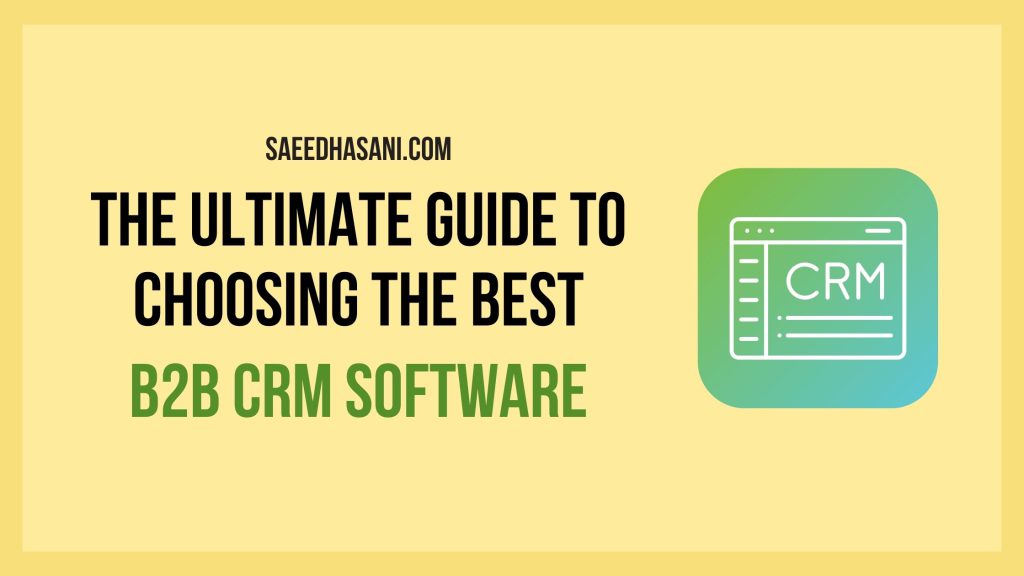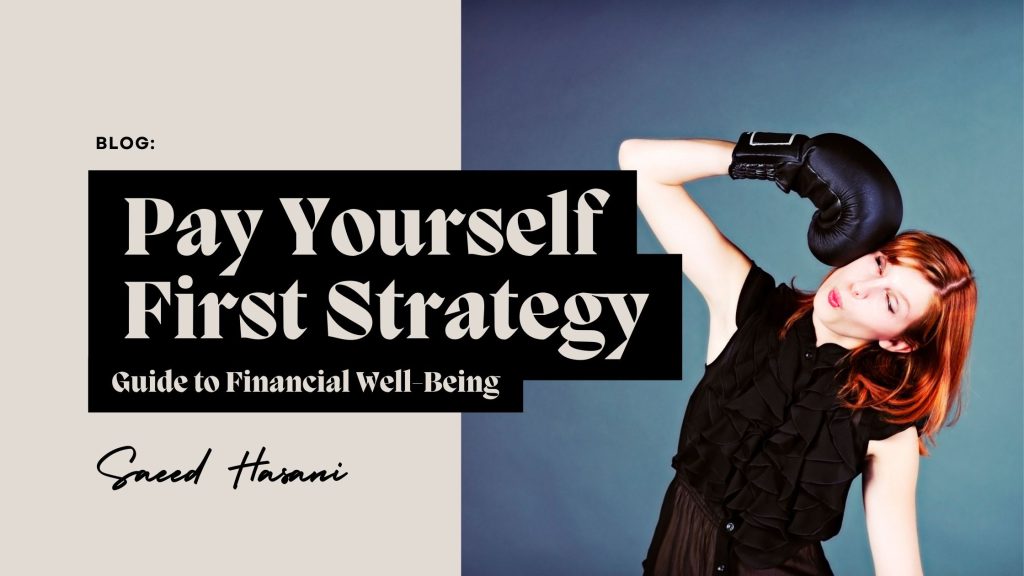The Ultimate Guide to Choosing the Best B2B CRM Software

Welcome to the ultimate guide on B2B CRM software. We’re about to embark on a journey through the exciting world of Customer Relationship Management (CRM) and how it can supercharge your B2B (business-to-business) marketing efforts.
In this blog post, we’re diving deep into the importance of CRM software in B2B businesses. We’ll explore how CRM can enhance your sales, marketing, and customer relationships, and we’ll give you a sneak peek at what criteria to consider when selecting the best B2B CRM software for your needs.
So, grab your coffee, settle into your comfy chair, and let’s get started on this thrilling CRM adventure. We’ll guide you through the fundamentals of B2B CRM, discuss its unique needs compared to B2C CRM, and delve into how it can revolutionize your sales processes and customer management. Buckle up, it’s going to be a fantastic ride!
Understanding B2B CRM
Here, we’re diving headfirst into the world of B2B CRM (Customer Relationship Management). So, grab your coffee, settle into your comfy chair, and let’s get started.
Defining B2B CRM and its Unique Needs
Okay, let’s kick things off with the basics. CRM is like the Swiss Army knife of modern marketing. It helps businesses manage their interactions and relationships with customers, which is crucial for nurturing leads, retaining clients, and boosting sales.
But wait, there’s a twist here. B2B CRM isn’t your run-of-the-mill CRM. It’s like CRM’s sophisticated cousin with unique needs. In B2B (business-to-business) settings, the game is different. You’re not dealing with individual consumers; you’re handling businesses as your customers.
So, what sets B2B CRM apart? For starters, B2B relationships tend to be long-term and complex. You’re not just trying to sell a product; you’re building trust and partnerships. Your clients have multiple decision-makers, and the sales cycle can be months, if not years. That’s where B2B CRM swoops in to streamline and optimize these intricate relationships.
How does B2B CRM differ from B2C CRM?
Let’s clear this up right away. B2B CRM and B2C CRM are not twins; they’re more like distant cousins with different personalities.
In B2C (Business to Consumer) CRM, the focus is on high volumes of transactions. Think about an e-commerce giant tracking millions of individual customers’ preferences and buying patterns. It’s all about personalization and catering to individual tastes.
Now, shift gears to B2B CRM. Here, you’re dealing with a smaller pool of clients, but each one is a heavyweight. They’re not just buying a product; they’re investing in a long-term relationship. Your CRM system needs to be fine-tuned to manage these complex relationships, understand the organization’s needs, and align your products or services with their strategic goals.
The Impact of B2B CRM on Sales Processes and Customer Management
Ah, the meat and potatoes of it all—how B2B CRM can supercharge your sales processes and customer management.
First off, let’s talk efficiency. B2B CRM tools can automate a lot of the mundane tasks, freeing up your sales team to focus on what they do best: building relationships and closing deals. It helps with lead scoring, lead nurturing, and tracking interactions so that your team can swoop in at just the right moment.
But it’s not just about efficiency; it’s about effectiveness too. B2B CRM provides deep insights into your clients’ behaviors, needs, and pain points. This knowledge is gold when it comes to tailoring your marketing campaigns and product offerings. It’s like having a crystal ball that tells you exactly what your clients want before they even know it themselves.
Plus, B2B CRM fosters collaboration within your organization. Different departments can access the same customer data, ensuring that everyone is on the same page. This seamless communication leads to smoother customer management and a consistent brand experience.
B2B CRM is your secret weapon in the world of business-to-business marketing. It’s all about understanding the unique needs of B2B relationships, recognizing how it differs from B2C CRM, and leveraging it to revolutionize your sales processes and customer management.
Key Features to Look for in B2B CRM Software
Here, we’re rolling up our sleeves and getting into the nitty-gritty of B2B CRM software. You know, the tools that make our lives easier and our marketing strategies smoother. Here are some key features to keep your radar on when shopping for B2B CRM software:
1. Contact and Lead Management
First things first, you need a B2B CRM that’s a pro at managing contacts and leads. It should be like your digital rolodex, but way smarter. Look for a system that helps you organize your contacts, track interactions, and nurture leads throughout their journey. The more automation, the merrier!
2. Sales Pipeline and Opportunity Tracking
Your CRM should be your trusty sidekick when it comes to tracking your sales pipeline. It should give you a clear view of where each deal stands, from the initial contact to the final handshake. A good B2B CRM helps you prioritize opportunities and ensures no deal falls through the cracks.
Integration Capabilities with Other Business Tools
Let’s face it, in today’s digital age, we’re drowning in a sea of tools and apps. Your CRM needs to play nice with others. Look for integration capabilities with your email, marketing automation software, and other business tools. It’s like having a seamless tech ecosystem.
Customization Options for Tailored Workflows
Every business is unique, and so are your workflows. Your CRM should be customizable to fit your specific needs. Whether it’s tweaking fields, creating custom reports, or automating processes, your CRM should be as flexible as your favorite yoga instructor.
Reporting and Analytics for Data-Driven Decisions
Data is king in marketing, and your CRM should be the royal treasury. It should provide you with robust reporting and analytics tools that help you make data-driven decisions. The more insights, charts, and graphs, the better.
Collaboration and Communication Tools for Team Coordination
Marketing is a team sport, and your CRM should be your playbook. It should have built-in collaboration and communication tools that keep your team on the same page. Think of shared calendars, task assignments, and in-app messaging. It’s all about making teamwork a breeze.
Scalability to Accommodate Business Growth
Last but not least, think about the future. Your business is destined for greatness, right? Your CRM should be ready to grow with you. Look for scalability features that can handle an influx of new contacts, deals, and data as your business expands.
When you’re on the hunt for B2B CRM software, keep your eyes peeled for these key features. They’ll be your trusty companions as you navigate the complex world of B2B marketing, helping you streamline processes, make data-driven decisions, and, ultimately, achieve marketing greatness.
Top B2B CRM Software Solutions
Let’s get down to business with real examples of top B2B CRM software solutions that marketing specialists should consider.
In-Depth Review of the Best B2B CRM Software Options
1. Salesforce: The Swiss Army Knife of CRMs
Salesforce is the OG of CRM software. It’s a powerhouse, offering an array of features like contact and lead management, marketing automation, and customer support. With Salesforce, you can create highly customized workflows, track sales pipelines with ease, and integrate them with almost any other business tool you can think of.
The benefits? It’s like having a full-scale customer management command center. Pricing can vary depending on your needs, but there are options for businesses of all sizes.
2. HubSpot CRM: The Data-Driven Dynamo
HubSpot CRM is a popular choice known for its user-friendly interface and robust reporting and analytics capabilities. It simplifies contact and lead management, making it ideal for marketing specialists.
The benefit? You’ll gain valuable insights into your marketing efforts and can make data-driven decisions to optimize your strategies. The pricing is competitive, with a free version available to get you started.
3. Zoho CRM: The Scalability Champion
Zoho CRM is all about scalability. It can grow with your business without breaking a sweat. As your business expands, Zoho CRM provides the flexibility to add features and modules to suit your needs.
The benefits? You won’t outgrow your CRM anytime soon, saving you the hassle of switching systems. Pricing is budget-friendly, making it an excellent choice for startups and small businesses.
Real-World Case Studies of Businesses Successfully Using These CRMs
Now, let’s dive into some real-world examples of businesses that have found success with these CRMs:
- Salesforce: Imagine a global tech company struggling to coordinate sales teams spread across continents. Salesforce came to the rescue, providing a centralized platform for managing leads, contacts, and customer data. Within a year, they saw a 25% increase in sales productivity, and they could easily track and nurture leads across the globe.
- HubSpot CRM: Picture a mid-sized marketing agency looking to streamline its operations. HubSpot CRM helped them automate lead nurturing, email marketing, and client communication. In just six months, they doubled their client retention rate and improved their ROI on marketing campaigns by 30%.
- Zoho CRM: Think of a small e-commerce business that wants to expand into new markets. Zoho CRM allowed them to adapt their sales processes and add new features as they grew. They didn’t need to worry about data migration or starting over from scratch. Zoho CRM acted as their growth partner, supporting them through every phase.
So, these are the real deal B2B CRM solutions you should have on your radar. Whether you’re aiming for all-around efficiency, data-driven insights, or seamless scalability, Salesforce, HubSpot CRM, and Zoho CRM have proven themselves in the real world. These case studies highlight how they can make a significant impact on your business operations.
Choosing the Right CRM for Your B2B Business
Let’s get down to brass tacks and talk about choosing the right CRM (Customer Relationship Management) for your B2B business. It’s like finding the perfect pair of sneakers – it needs to fit just right. Here’s how to make sure you’re striding in the right direction:
- Assessing Your Business Needs and Goals
First things first, you’ve got to know what you want to achieve. Take a deep dive into your business. What are your specific needs and goals? Are you aiming to streamline lead management? Boost sales? Enhance customer support? Knowing your objectives is like having a treasure map to the right CRM solution.
- Identifying Your Budget Constraints
Money talks, right? You need to figure out your budget. Be honest about what you can afford, but also think about the long-term. Some CRMs offer tiered pricing, so you can start small and scale up as your business grows. Remember, the most expensive option isn’t always the best fit.
- Evaluating the Scalability of CRM Solutions
Speaking of growth, think about scalability. Is the CRM flexible enough to accommodate your expanding business? You don’t want to outgrow your CRM like last year’s smartphone. Ensure it can grow with you and adapt to your changing needs.
- Considering User-Friendliness and Training Requirements
Ease of use is crucial. You don’t want a CRM that requires a PhD in software engineering to operate. Consider the learning curve. Are there training resources available? Will your team need extensive training? A user-friendly CRM can save you a ton of headaches down the road.
- Exploring Trial Periods and Demos
Imagine buying a car without test-driving it – madness, right? Look for CRMs that offer trial periods or demos. It’s like kicking the tires and taking it for a spin. This hands-on experience will help you get a feel for how the CRM works in your day-to-day operations.
- Seeking Feedback from Existing Users
Last but not least, don’t be shy about asking for feedback. Reach out to businesses similar to yours that are using the CRM you’re considering. They’ve been there, done that, and can give you the inside scoop on what it’s really like. User reviews and testimonials are golden nuggets of information.
Choosing the right CRM can be a game-changer for your B2B business. Assess your needs, mind your budget, plan for growth, prioritize user-friendliness, take it for a spin, and listen to those who’ve walked the CRM path before you. With these steps, you’ll be striding confidently toward CRM success.
Implementation and Integration
Let’s talk about the not-so-glamorous but oh-so-important stuff: CRM implementation and integration. Think of it as the backstage crew that makes the show run smoothly. Here’s the lowdown:
A. Best Practices for CRM Implementation
Okay, so you’ve chosen your CRM; now it’s time to put it into action. Start by defining clear goals and objectives. What do you want to achieve with your CRM? Then, assemble your dream team. Get the right people on board who’ll champion this CRM journey.
Don’t rush into it – plan your implementation like a pro. Map out your processes, customize the CRM to fit your needs, and roll it out gradually to avoid overwhelming your team. Communication is key. Keep everyone in the loop, and make sure they understand why this CRM is a game-changer.
B. Data Migration and Import/Export Considerations
Data, oh glorious data! When you’re moving from one CRM to another or importing/exporting data, tread carefully. Start with a data cleanup; no one wants to bring old, irrelevant data along for the ride. Create a data migration plan, test it thoroughly, and always have a backup in case things go sideways.
C. Integrating CRM with Other Business Tools
Your CRM shouldn’t be a loner; it needs friends! Think email marketing, marketing automation, and even your ERP system. Integration is key to streamlining your operations. Look for a CRM that plays well with others. It’s like having all your tools singing in harmony.
D. Training and Onboarding Strategies for Your Team
Now, here’s the fun part: getting your team up to speed. Don’t just toss them into the deep end; that’s a recipe for disaster. Invest in training and onboarding. Offer hands-on sessions, tutorials, and documentation. Encourage your team to ask questions and explore. You want them to feel like CRM wizards, not lost in a labyrinth.
Oh, and keep the learning going. CRM updates and improvements are like new seasons of a favorite show. Stay updated and ensure your team does too.
CRM implementation and integration may not be the star of the show, but they’re the unsung heroes that can take your marketing game to the next level. Follow these best practices, handle your data with care, integrate like a pro, and make your team feel like CRM superstars. With these strategies, your CRM journey will be a blockbuster hit!
Maximizing ROI with B2B CRM
Let’s get down to brass tacks and talk about maximizing ROI with B2B CRM – the magic tool that can turn your marketing efforts into a goldmine. Here’s how to make the most of it:
Strategies for Aligning CRM with Your Sales and Marketing Efforts
First things first, your CRM should be like the matchmaker of your sales and marketing teams. It’s all about creating a seamless alignment between these two powerhouses.
Start by defining your customer journey. Map out the touchpoints where marketing hands off leads to sales. Make sure everyone is on the same page about lead qualification criteria. This way, no lead gets lost in the shuffle.
Leverage automation to nurture leads and score them based on engagement and behavior. Set up workflows that automatically notify your sales team when a lead is hot and ready to close. The key here is collaboration and communication. Keep the channels open between your marketing and sales teams, and watch those conversions soar.
Leveraging CRM Data for Personalization and Customer Insights
Data is the holy grail of marketing, and your CRM is the treasure chest. Use it to create personalized experiences that wow your clients. Dive deep into CRM data to understand customer behaviors, preferences, and pain points.
Segment your audience based on this data and tailor your marketing campaigns accordingly. Send personalized emails, recommend products or services based on their past interactions, and use their data to predict future needs.
Remember, customers love feeling special. Personalization isn’t just a marketing buzzword; it’s a game-changer.
Measuring and Optimizing CRM Performance
You can’t improve what you don’t measure, right? Your CRM should be a goldmine of insights. Track key performance indicators (KPIs) like lead conversion rates, customer acquisition costs, and customer lifetime value.
Regularly review these metrics to identify bottlenecks and areas for improvement. Is a certain marketing channel underperforming? Are leads getting stuck at a particular stage of the sales funnel? Your CRM data holds the answers.
Tips for Continuous Improvement and CRM Adoption
Lastly, don’t treat your CRM like a set-and-forget tool. It’s a living, breathing part of your marketing strategy that needs continuous care.
Invest in ongoing training for your team. Keep them updated on new CRM features and best practices. Encourage feedback and iterate based on user experiences. Your team should feel like they’re co-piloting the CRM’s success.
And remember, Rome wasn’t built in a day. CRM adoption can take time. Be patient, and provide support for your team to make the transition smooth. Celebrate small wins and keep an eye on the big picture: a thriving B2B CRM that’s bringing in the ROI.
So, marketing specialists, there you have it – your roadmap to maximizing ROI with B2B CRM. Align your teams, personalize like a pro, measure and optimize performance, and keep that CRM ship sailing smoothly. With these strategies, you’ll be turning your CRM into a marketing powerhouse.
Case Studies of B2B CRM Success
Let’s dive into some inspiring real-world success stories where B2B CRM played a starring role. These are the tales that prove that with the right tools and strategies, you can take your B2B game to the next level.
7 Real-World Examples of Businesses Achieving Remarkable Results with CRM
- Salesforce at IBM: IBM, a tech giant, used Salesforce to streamline its sales and customer service processes. Result? A whopping 30% increase in its sales pipeline, and they cut their response time by 99%. It’s like a turbo boost for customer satisfaction.
- Adobe with Marketo: Adobe, a leader in creative software, integrated Marketo into its CRM strategy. This move led to a 10% increase in conversion rates and a 20% increase in marketing-generated revenue. Adobe found the marketing magic wand.
- Microsoft Dynamics at HP: HP, the tech heavyweight, turned to Microsoft Dynamics to enhance its partner relationship management. With CRM, they improved partner satisfaction by 30% and increased their partner-generated revenue by 20%. That’s what you call a win-win.
- Oracle for Rockwell Automation: Rockwell Automation used Oracle’s CRM to automate lead scoring and nurture processes. The result? A 25% increase in lead conversion rates and a 10% reduction in the sales cycle. Talk about efficiency!
- HubSpot at SurveyMonkey: SurveyMonkey, a survey software company, harnessed HubSpot CRM to supercharge its marketing efforts. With CRM, they boosted leads by 25%, reduced marketing costs by 30%, and achieved a 10% increase in overall revenue. Surveys have never been so profitable.
- Zoho CRM at Wix: Wix, a website-building platform, integrated Zoho CRM into their operations. This move increased their leads by 40%, improved their conversion rates by 20%, and reduced customer churn by 15%. A web of success!
- Pipedrive for Vimeo: Vimeo, the video-sharing platform, used Pipedrive CRM to better manage its sales pipeline. With CRM, they witnessed a 35% increase in sales conversion rates and a 20% boost in upselling and cross-selling. Lights, camera, revenue!
7 Highlighting Specific Features and Strategies That Led to Success
- Automation Excellence: Many of these success stories hinged on CRM’s automation features. Whether it’s lead nurturing, email marketing, or sales pipeline management, automation streamlines processes and frees up time for more strategic tasks.
- Data-Driven Decisions: CRM’s robust analytics and reporting capabilities were instrumental. These businesses used data insights to refine their marketing strategies, improve lead conversion rates, and boost overall revenue.
- Integration Innovation: Seamless integration with other business tools like marketing automation and email marketing platforms was a common theme. This allowed for a cohesive tech ecosystem, ensuring data flows freely and processes are efficient.
- Personalization Power: CRM data was used to segment audiences and deliver highly personalized experiences. Whether it’s tailored emails or product recommendations, personalization creates stronger customer connections.
- Efficiency Boost: Streamlined sales processes and reduced response times were often key to success. CRM helped these businesses become more efficient, ultimately leading to improved customer satisfaction.
- Scalability Solutions: For some, the scalability of their chosen CRM was paramount. It allowed them to grow without the headaches of switching systems or losing valuable data.
- Team Empowerment: Training and onboarding strategies ensured teams were well-equipped to harness CRM’s power. Teams felt confident and competent, which led to better adoption and results.
These B2B CRM success stories are like a beacon of hope for marketing specialists. They show that with the right CRM and smart strategies, you can achieve remarkable results – from boosting leads and revenue to improving customer satisfaction and efficiency. So go ahead, take a page from these success stories, and let your CRM journey be the stuff of legends.
Future Trends in B2B CRM
Let’s take a peek into the crystal ball and see what the future holds for B2B CRM. It’s like looking at the roadmap for where our industry is headed.
Emerging Technologies and Innovations in CRM
Buckle up, because emerging technologies are shaking things up in the world of B2B CRM. One word: automation. We’re talking AI-powered chatbots that can handle routine customer inquiries, predictive analytics that can anticipate your client’s needs and machine learning that continually fine-tunes your marketing strategies.
Another game-changer is the Internet of Things (IoT). Imagine your CRM not only managing customer data but also tapping into data from smart devices. This can provide real-time insights into how your products are used, helping you tailor your offerings better than ever.
And let’s not forget about blockchain. It’s not just for cryptocurrencies. In the future, it could revolutionize data security and transparency in CRM, giving customers more confidence in how their data is handled.
Predictions for the Future of B2B CRM Software
What’s in store for B2B CRM software? Well, expect even more user-friendly interfaces. The days of clunky CRM systems are numbered. Future CRMs will be intuitive, offering a delightful user experience.
Integration will also be a big focus. Imagine your CRM seamlessly connecting with all your marketing tools, communication platforms, and even your coffee machine (okay, maybe not that last one). This integration will create a unified tech ecosystem that’s a breeze to manage.
Personalization is going to get more personal. Your CRM will not only know your customers’ names but also their preferences, habits, and even their mood. This level of personalization will take customer relationships to a whole new level.
Lastly, mobility will be the name of the game. With more people working remotely, CRMs will become even more accessible on mobile devices, allowing you to manage your customer relationships from anywhere, anytime.
Staying Ahead of the Curve in B2B CRM
So, how do you stay ahead of the curve in B2B CRM? It’s all about being adaptable and willing to embrace change. Keep an eye on emerging technologies, attend industry conferences, and network with fellow specialists to learn from their experiences.
Invest in ongoing training for your team. Technology evolves fast, and you don’t want to be left behind. Make sure your team is equipped with the skills and knowledge to harness the power of the latest CRM innovations.
Lastly, be open to experimentation. Don’t be afraid to pilot new CRM features or technologies in your marketing campaigns. Sometimes, being an early adopter can give you a significant competitive advantage.
The future of B2B CRM is an exciting one, full of possibilities. Embrace these emerging technologies, keep an eye on trends, and never stop learning. With the right approach, you’ll be riding the wave of CRM innovation to greater marketing success.
Conclusion
It’s time to wrap things up and tie a neat bow around our B2B CRM adventure. We’ve covered a lot of ground, so let’s hit the highlights one more time:
Choosing the right B2B CRM is like finding the perfect partner in crime for your marketing endeavors. Remember these key considerations:
- Assess your business needs and goals.
- Mind your budget, but also think long-term.
- Ensure scalability for future growth.
- Prioritize user-friendliness and training.
- Test drive with trials and demos.
- Seek feedback from real users.
If you’re still on the fence about investing in a B2B CRM solution, here’s your nudge. CRM isn’t just another software; it’s a game-changer. It’s your secret weapon for improving customer relationships, streamlining operations, and boosting ROI. Don’t wait; the sooner you invest, the sooner you’ll see the benefits.
Remember, getting the right CRM is just the beginning. It’s not a one-and-done deal. CRM is a long-term relationship. It’s the glue that keeps your marketing, sales, and customer support teams together. It’s the oracle that guides your data-driven decisions.
CRM will continue to play a crucial role in your business’s growth journey. As technology evolves and customer expectations rise, CRM will be there to adapt and help you meet those challenges head-on. So keep nurturing those customer relationships, keep fine-tuning your strategies, and keep riding the CRM wave to success.
Alright, it’s been a pleasure taking you on this CRM journey. Remember, the world of B2B CRM is ever-evolving, and the possibilities are endless. So go out there, choose wisely, and let your CRM be the driving force behind your marketing triumphs.







Responses